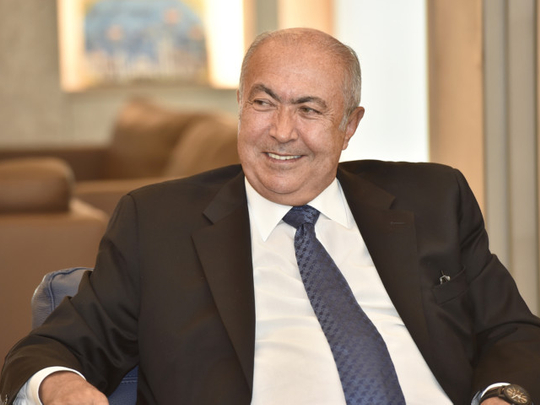
Beirut: Lebanese politician and recently-elected member of parliament, Fouad Makhzoumi, has a emerged as a fresh new face in the country’s Sunni community.
The Beirut native and self-made billionaire businessman is challenging traditional political families that have held sway since the 1940s.
He says his victory in the polls was an indication that voters have grown tired with the monopolisation of power that is prevalent across political and sectarian divides in the country.
However, he said he has no intention of confronting Sa’ad Hariri, Lebanon’s premier and chief Sunni leader.
In an interview with Gulf News, Makhzoumi stressed the importance of Saudi Arabia’s role in the region and in Lebanon in light of Iran’s expanding prescence in both.
He believes Lebanon’s future remains tightly linked to the Gulf countries, pointing to the more than 250,000 Lebanese workers and their families who live in the Gulf.
As for the sensitive issue of Hezbollah’s growing influence in the country and its role in fighting in Syria to bolster President Bashar Al Assad’s government, Makhzoumi tip-toed around the issue.
He said he believed the war would wrap up soon and Hezbollah would no longer have a reason to maintain a physical military presence there, without explicitly condemning its involvement in the war.
GN: You were recently elected as an independent MP for Beirut. Why do you think the Sunnis of Lebanon voted for you?
FM: Lebanon is a country where pluralism and democracy are a must; and Beirut has historically had more than one Sunni leader.
Attempts to monopolise the leadership have backfired and new leaders are emerging among the Sunni community.
Diversity is a must.
In my opinion, Beirutis reacted against the current system that has contributed so little to improving their lives, while contributing so much to corruption.
The Lebanese in general are increasingly fed up with traditional politicians.
I think Sunnis voted for me because they never felt truly represented in parliament.
I’m not like other politicians, I don’t deal with governments and I didn’t make my money in this country.
I’m not a part of the 10,000 people who control 48 per cent of Lebanon’s assets.
Beirutis voted for me because I had a clear and direct programme that highlights solutions to their problems.
I also think my humanitarian work, particularly in Beirut, for over two decades, has also contributed to my appeal.
People also appreciated how I fought for Lebanon’s wealth by ensuring that the country’s hidden oil and gas treasures don’t end up in the pockets of politicians and their cronies.
GN: Several politicians from Hariri’s Future Movement have accused you of being backed by Syria to run for prime minister in 2000. How do you react to this claim?
FM: If I truly was a “Syrian candidate” then why wasn’t I appointed to any ministerial positions during the time where Syria exercised power in Lebanon?
I think my political opponents resorted to such accusations because they have nothing else to use against me.
It is a known fact that most, if not all of them, were actually in bed with the Syrians at that time and shared with them the country’s wealth and were compensated by being elected or appointed to public offices.
Having said that, I have no desire for any personal confrontation with Hariri or any other politician.
GN: Where do you stand on two critical issues facing Lebanon today: Syrian refugees and Hezbollah’s involvement in the Syria war?
FM: It is an absolute must that Syrian refugees return to their homeland. We are witnessing a few departures currently. I do hope this pace will be accelerated, as Lebanon can no longer sustain the economic and financial strain of their presence.
As for Hezbollah involvement in Syria, I think the Syrian crisis may still take some time to be resolved, but it will come to an end eventually.
That said, there will no longer be any reason for Hezbollah to maintain a physical military presence in Syria and they will withdraw sooner rather than later.
GN: Saudi Arabia and Iran have for a long time been engaged in a battle for influence in the region which has been particularly felt in Lebanon. How is your relationship with both countries?
FM: My relations with Saudi Arabia are great, developed while working there since 1975. As for my relationship with Iran, it is like any relation with a country that has an influence in the region.
But it is important to point out that I have no business ties there and have not had contact with Iran for a long time.
As for the effect the Saudi-Iranian rivalry has had on Lebanon, I believe that no matter what happens, our future will remain tightly linked to the Gulf.
Over 250,000 Lebanese workers and their families live in the Gulf.
The remittances from Lebanese in the Gulf boost the economy, and influx of Gulf tourists to Lebanon has created a lasting historical bond, apart from being a pillar of the Lebanese economy.
-With inputs from Layelle Saad GCC/Middle East Editor












